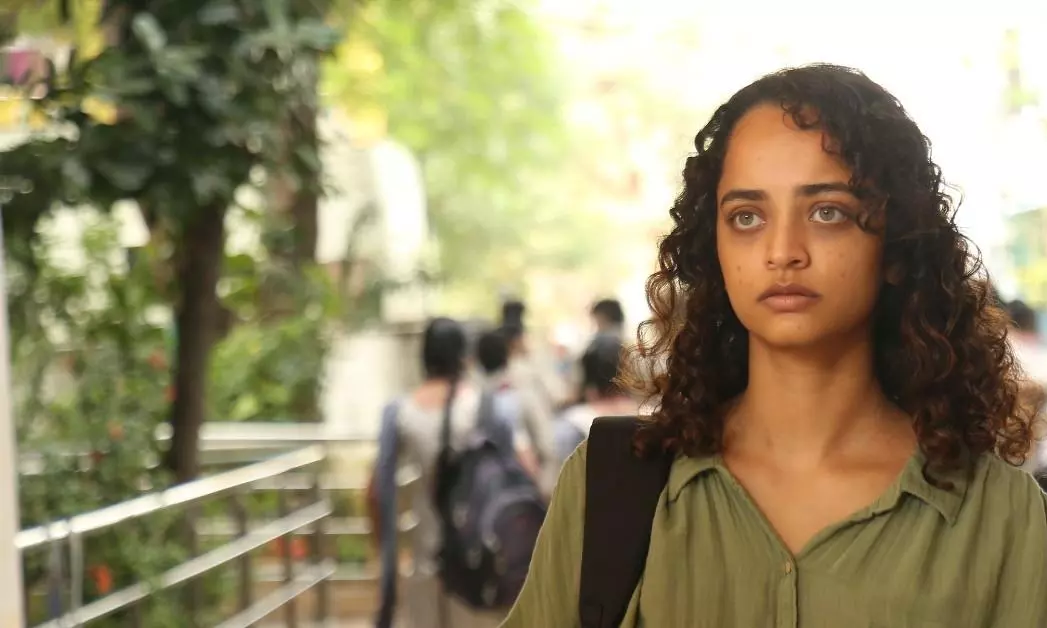Bad Girl review: Coming-of-age drama through female lens pushes boundaries
Varsha Bharath’s writing shines in its nuanced portrayal of the female experience, making Bad Girl a vital addition to Tamil cinema


Debutant director Varsha Bharath’s Bad Girl is a poignant coming-of-age drama that traces the transformative journey of its protagonist, Ramya, a young woman raised in the confines of an orthodox Brahmin household.
The film chronicles Ramya’s evolution from a naive schoolgirl to a fiercely independent working woman, navigating the complexities of past relationships, personal traumas, and societal expectations. The narrative arc resonates with authenticity but falls short of its full potential due to underdeveloped conflicts and a lack of emotional depth in its resolution.
A teaser of the film, released in January, attracted immense controversy. Producer Vetrimaaran and Anurag Kashyap were heavily criticised for the depiction of the Brahmin community.
Also read: 'Bad Girl' set in a milieu that I relate to: Director Varsha Bharath
Breaks new ground
Tamil cinema has long celebrated coming-of-age stories centred on male protagonists, exploring their struggles, relationships, traumas, triumphs, and personal growth. Bad Girl breaks new ground by offering a female perspective in this genre, a refreshing shift that illuminates the challenges women face in a patriarchal society.
The film delves into Ramya’s experiences— her heartbreaks, toxic relationships, and rebellion against familial constraints — as she carves out her path toward independence. However, while the premise is compelling, the narrative often skims the surface, failing to explore deeply Ramya’s emotional and psychological arc.
The film’s climax, in particular, feels underwhelming, lacking the intense conflicts and dramatic stakes that could have elevated it into a more impactful exploration of its themes.
Varsha Bharath's writing
Despite these shortcomings, Bad Girl is far from dismissible. Varsha Bharath’s writing shines in its nuanced portrayal of the female experience, offering a window into the emotional landscape of women grappling with societal expectations, romantic disillusionment, and personal aspirations.
The film thoughtfully examines how women confront limitations in a patriarchal world, navigate heartbreak, and strive for autonomy against all odds. This fresh perspective makes Bad Girl a vital addition to Tamil cinema, challenging conventional narratives and amplifying a voice rarely heard in the industry’s coming-of-age canon.
Also read | Madharaasi review: Murugadoss makes a comeback, Sivakarthikeyan shines as action hero
Anjali Sivaraman shines
At the heart of the film is Anjali Sivaraman’s stellar performance as Ramya. She brings remarkable depth to the character, effortlessly embodying Ramya’s multifaceted journey. She captures the innocence of Ramya’s school days, the simmering frustration of her college years entangled in a toxic relationship, and the quiet strength she discovers in embracing her independence.
Anjali's ability to convey such a wide range of emotions with authenticity and subtlety marks her as a standout talent, anchoring the film even when its narrative falters.
Another highlight is the film’s exploration of the mother-daughter dynamic, a relationship rarely given centre stage in Kollywood, which often focuses on the father-son relationship. The tension between Ramya and her mother, portrayed with earnest conviction by Shanthipriya, feels both modern and deeply relatable.
Shanthipriya's compelling performance
Shanthipriya delivers a compelling performance, balancing maternal concern with the rigidity of tradition, creating a character that is both flawed and profoundly human. This dynamic adds a layer of emotional complexity to the film, addressing generational differences and societal pressures with sensitivity.
Equally noteworthy is the portrayal of female friendships through the character of Saranya Ravichandran, Ramya’s close confidante. Saranya’s role is thoughtfully crafted, showcasing the strength and camaraderie of female bonds— a refreshing departure from the male-centric friendship circles of Tamil cinema. The authenticity of their relationship adds warmth and relatability to the narrative, further underscoring Bharath’s commitment to highlighting female experiences.
Technical wins
The film’s technical aspects also deserve praise. Amit Trivedi’s music beautifully complements the coming-of-age theme, with a soundtrack that captures the emotional ebbs and flows of Ramya’s journey.
The cinematography, helmed by Preetha Jayaraman, Jagadeesh Ravi, and Prince Anderson, skillfully delineates the different timelines, from the nostalgic hues of the 1990s to the vibrant present day, creating a visual tapestry that enhances the storytelling. Additionally, the production design stands out for its meticulous recreation of the 1990s, lending authenticity and immersing the audience in Ramya’s formative years.
Also Read: Inspector Zende review: Manoj Bajpayee lifts a wobbly film about Charles Sobhraj chase
Varsha Bharath’s debut signals the arrival of a promising voice that could deliver even more powerful stories with greater dramatic intensity in the future. For its fresh perspective on female friendships, mother-daughter relationships, and the quest for independence, Bad Girl is a film that demands attention and sparks hope for more such narratives in Tamil cinema.

